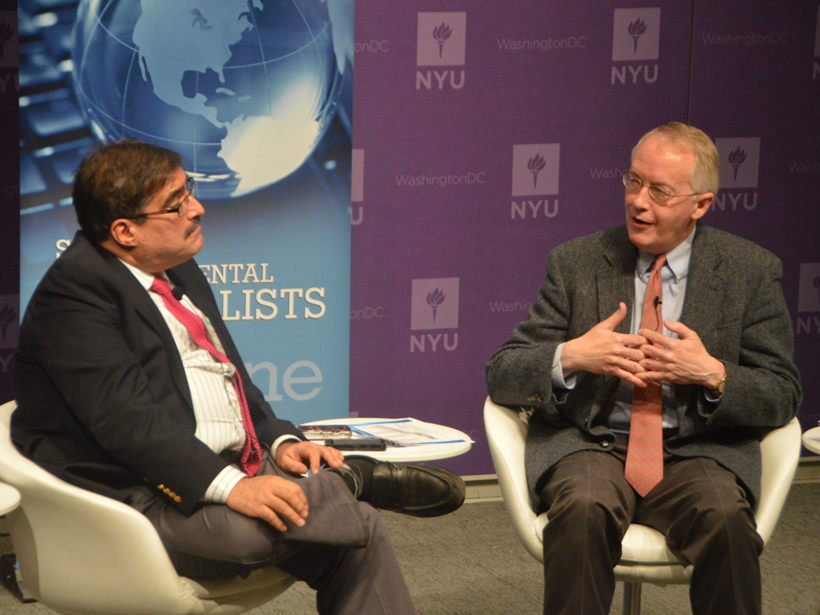If you want to know what President Donald Trump plans to do about climate change and other environmental issues, just look at his campaign promises. That’s what the former head of the president’s transition team for the U.S. Environmental Protection Agency (EPA) recently told a roomful of environmental journalists.
The initial weeks of the Trump administration “suggest that [Trump] is intent on keeping as many promises [as he can,] as quickly as he can.”
The initial weeks of the Trump administration “suggest that [Trump] is intent on keeping as many promises [as he can,] as quickly as he can,” Myron Ebell said at a 4 February conference about the Trump administration and the environment organized by the Society of Environmental Journalists.
Trump promised in campaign speeches to scrap the Obama administration’s Clean Power Plan to regulate greenhouse gases from power plants, withdraw from the Paris climate agreement, and defund the United Nations climate programs, he said. Ebell, who noted that he doesn’t speak for the Trump administration, is the director of the Center for Energy and Environment at the Competitive Enterprise Institute (CEI), a Washington, D. C.–based public policy institute that advocates for limited government.
Trump also promised to undo the Obama administration’s Climate Action Plan, slash EPA’s budget, and promote policies that lean on fossil fuels to make the United States the world’s energy superpower, Ebell said in a presentation, part of which was a public interview with Associated Press reporter Seth Borenstein. Ebell, who argued that his views on climate are “somewhat more sophisticated than being labeled a climate denier,” sparred with Borenstein about the threat of climate change.
Moving Quickly
Keeping true to Trump’s campaign policies initially involves mostly undoing executive orders and regulations issued in the past and primarily by the Obama administration, Ebell said. He noted that virtually none of those recent measures dealing with climate change and energy were legislated by Congress.
“We didn’t spend lots of time looking at how the administration could approach Congress and ask for legislation.”
The EPA transition plan focuses on how to get things done quickly more than on what can be accomplished legislatively over 4 years, according to Ebell. “We didn’t spend lots of time looking at how the administration could approach Congress and ask for legislation,” said Ebell. “If you want inaction in recent years, particularly on energy and environmental policy, you go to Congress, because they’ve proven that everything is frozen up there. You can’t move legislation. You can’t get it enacted.”
Plans for the EPA
During the campaign, Trump called for refocusing the EPA on core topics. In line with that objective, Ebell has recommended reducing the agency’s staff by one half to two thirds. “Let’s set an aspirational goal for reducing the size of the EPA by figuring out which programs have succeeded and can be much smaller than they are today and where more efforts can be devolved to the states,” he said. “In general, the states are better at it because they are closer to the ground, they’re more accountable, and they’re also somewhat cheaper.”
Borenstein asked whether pursuing deep cuts at EPA was part of the administration’s strategy to try to achieve a significant cut even if it might be less than the publicly stated goal. “I believe that is the correct negotiating technique,” said Ebell, recommending that the audience read Trump’s book The Art of the Deal.
Antiscience?
Ebell said it is surprising to him that some people assert that the Trump administration is going to deny science or try to destroy scientific data. “I don’t speak for the administration, but I know of no one on my side of the debate who wants to manipulate data or wants to destroy data,” he told Eos after his presentation. Nevertheless, scientists have been busy copying government science data out of fear that the data could disappear.
Scientists and others have raised concerns about Trump’s environmental plans and agency appointees and nominees. However, Ebell said that scientists should approach those appointees “as people who are not antiscience and who are willing to find out the best science that’s available and willing to hear different viewpoints in the scientific community.”
—Randy Showstack (@RandyShowstack), Staff Writer
Citation:
Showstack, R. (2017), Climate rules on chopping block, says Trump EPA transition head, Eos, 98, https://doi.org/10.1029/2017EO067999. Published on 17 February 2017.
Text © 2017. The authors. CC BY-NC-ND 3.0
Except where otherwise noted, images are subject to copyright. Any reuse without express permission from the copyright owner is prohibited.

